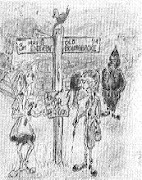
I thought it would be interesting to take part in ‘The Big Garden Birdwatch’. Another of my bright ideas.
I downloaded a recording sheet with its pictures of the 20 most common British birds. It was a little discouraging that I hadn’t realised that a pigeon isn’t just a pigeon; it can be a collared dove, a woodpigeon or a feral pigeon.
I decided to split my hour’s observation into two, half an hour looking out of the back window, across the council’s lawns, where feeding birds is FORBIDDEN, and over a school playing field. And then out of the front to look across the road towards houses where people actually have gardens.
For 10 minutes I saw nothing at all, and then a flock of small birds flashed past. What the hell were they? I quickly consulted the pictures. Sparrows? But I thought their tails were a bitty stubby. So, coal tits? I hoped to God they weren’t dunnocks.
I saw a couple of crows. That was easy enough. Then I saw something hovering high in the sky. Maybe a hawk of some kind. That would be a treat. But no, it was a seagull coasting around and caught by the wind.
Then a pair of magpies flew past. Two for joy. I wished them good morrow, as is the custom. There was a lot of avian activity on the other side of the playing field, where the houses are more affluent. We have to eat our own crumbs where I live.
I move to the front of the flat and drew the blinds back. Immediately I felt like a peeping Tom and it didn’t help that I’d only got a dressing-gown on. I closed the blinds again and peeked through. Oh Christ, that’s worse. I moved to the bedroom where there are net curtains and looked down. It was the first time I’d noticed that the old woman downstairs has got a bird-table, WHICH IS AGAINST THE RULES.
But it meant I got to see a few more birds. Sometimes the low hedge down there is buzzing with birds and there were half a dozen little fellows hopping about. I’d always thought they were chaffinches, but I noticed they’d got streaks on their back. Sparrows then.
One little chap was struggling with a large piece of bread, until a couple of blackbirds relieved him of it. Bastards!
And that was about it. A bit disappointing really. I wasn’t expecting golden eagles or peregrine falcons, but a few sparrows are hardly something you’d sell tickets for.
But I can see the fascination of birdwatching. They can be so graceful floating around in the sky, just the occasional stroke of the wings propelling them along. Or flapping furiously directly to some unknown destination. I love those swirling patterns of starlings, the deadly dives of hawks, and the evil courage of magpies. To see a kingfisher, or a woodpecker, or an owl is a privilege I’m rarely granted.
I downloaded a recording sheet with its pictures of the 20 most common British birds. It was a little discouraging that I hadn’t realised that a pigeon isn’t just a pigeon; it can be a collared dove, a woodpigeon or a feral pigeon.
I decided to split my hour’s observation into two, half an hour looking out of the back window, across the council’s lawns, where feeding birds is FORBIDDEN, and over a school playing field. And then out of the front to look across the road towards houses where people actually have gardens.
For 10 minutes I saw nothing at all, and then a flock of small birds flashed past. What the hell were they? I quickly consulted the pictures. Sparrows? But I thought their tails were a bitty stubby. So, coal tits? I hoped to God they weren’t dunnocks.
I saw a couple of crows. That was easy enough. Then I saw something hovering high in the sky. Maybe a hawk of some kind. That would be a treat. But no, it was a seagull coasting around and caught by the wind.
Then a pair of magpies flew past. Two for joy. I wished them good morrow, as is the custom. There was a lot of avian activity on the other side of the playing field, where the houses are more affluent. We have to eat our own crumbs where I live.
I move to the front of the flat and drew the blinds back. Immediately I felt like a peeping Tom and it didn’t help that I’d only got a dressing-gown on. I closed the blinds again and peeked through. Oh Christ, that’s worse. I moved to the bedroom where there are net curtains and looked down. It was the first time I’d noticed that the old woman downstairs has got a bird-table, WHICH IS AGAINST THE RULES.
But it meant I got to see a few more birds. Sometimes the low hedge down there is buzzing with birds and there were half a dozen little fellows hopping about. I’d always thought they were chaffinches, but I noticed they’d got streaks on their back. Sparrows then.
One little chap was struggling with a large piece of bread, until a couple of blackbirds relieved him of it. Bastards!
And that was about it. A bit disappointing really. I wasn’t expecting golden eagles or peregrine falcons, but a few sparrows are hardly something you’d sell tickets for.
But I can see the fascination of birdwatching. They can be so graceful floating around in the sky, just the occasional stroke of the wings propelling them along. Or flapping furiously directly to some unknown destination. I love those swirling patterns of starlings, the deadly dives of hawks, and the evil courage of magpies. To see a kingfisher, or a woodpecker, or an owl is a privilege I’m rarely granted.
But I think that will do for one year. And I still don’t know whether those gulls were common or herring.

